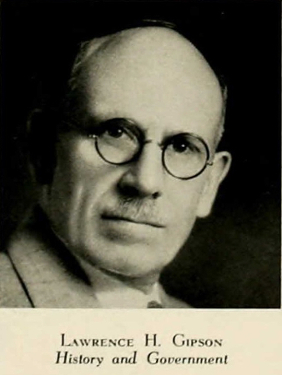Lawrence H. Gipson facts for kids
Lawrence Henry Gipson (born December 7, 1880 – died September 26, 1971) was an important American historian. He won big awards like the Bancroft Prize in 1950 and the Pulitzer Prize for History in 1962. These awards were for parts of his huge, fifteen-volume history book series called "The British Empire Before the American Revolution." This series was published between 1936 and 1970. Gipson was a leader of the "Imperial school" of historians. This group studied the British Empire from London's viewpoint. They often praised how well the Empire was run and how fair its politics were.
Early Life and Education
Lawrence Gipson was born in Greeley, Colorado. As a boy, his family moved to Caldwell, Idaho. He left high school early and worked many different jobs. He was a miner and even drove stagecoaches. He also worked at his family's business, Caxton Press. This company published local newspapers and magazines.
Gipson finished college at the University of Idaho in 1903. He was then chosen to be one of the first Rhodes Scholars. This special scholarship allowed him to study at Oxford University in England. He earned his B.A. from Oxford in 1907. He later said that the first group of Rhodes Scholars got a lot of attention. They felt like they were on trial, especially in the eyes of other scholars.
Teaching Career
After returning to the United States, Gipson taught at The College of Idaho for three years. In 1909, he married Jeannette Reed. She passed away in 1967. He then studied at Yale University from 1910 to 1911. After that, he became the head of the history department at Wabash College. He held this job until 1924. While teaching at Wabash, he earned his Ph.D. from Yale University in 1918. He studied with a famous colonial historian named Charles McLean Andrews. Gipson also won the John Addison Porter Prize from Yale that year.
A Famous Historian
In 1924, Gipson became a history professor at Lehigh University. He worked there until he died. He is best known for studying Colonial America and its role in the British Empire. However, some of his first articles were about the American Civil War. His Yale doctoral paper was published in 1920. It was called Jared Ingersoll: A Study of American Loyalism in Relation to British Colonial Government. For this book, he received the Justin Winsor Prize. This award came from the American Historical Association.
Gipson's most famous work was his fifteen-volume series. It was titled The British Empire Before the American Revolution. He spent many decades working on this huge project. He finished the last book just before he died. Three of his books won major history awards:
- The Great War for the Empire: The Years of Defeat, 1754-1757 (volume 6) won the 1948 Columbia University Loubat Prize.
- The Great War for the Empire: The Victorious Years, 1758-1760 (volume 7) won the 1950 Bancroft Prize.
- The Triumphant Empire: Thunderclouds Gather in the West, 1763-1766 (volume 10) won the 1962 Pulitzer Prize in History.
Gipson believed that the American Revolution happened because of changes in the British Empire after 1763. This was after Britain won the French and Indian War. He called this war "The Great War for the Empire." His main idea is clearly explained in his article "The American Revolution as an Aftermath of the Great War for the Empire, 1754-1763."
Gipson died on September 26, 1971, in Bethlehem, Pennsylvania. His ashes were buried in Caldwell. He left all his money to Lehigh University. This money helped create the Gipson Institute.
See also
 In Spanish: Lawrence H. Gipson para niños
In Spanish: Lawrence H. Gipson para niños
 | Sharif Bey |
 | Hale Woodruff |
 | Richmond Barthé |
 | Purvis Young |


